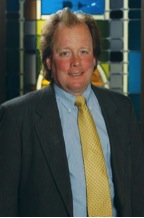In Memory of Prof. John Renaud
 John Eldon (Jack) Renaud, Ph.D., P.E., of Niles, Michigan, passed away on March 18, 2011, at the age of 50. Jack had a distinguished career in industry and academia and he was an active and enthusiastic supporter of ASME. He graduated with a BSME in 1982 from the University of Maine at Orono. He then worked five years as a manufacturing systems design engineer at the Eastman Kodak Company in Rochester, New York. He returned to graduate school, earning MS (`88) and PhD (`92) degrees in Mechanical Engineering from the Rensselaer Polytechnic Institute. Jack joined the Department of Aerospace and Mechanical Engineering at the University of Notre Dame in 1992 as the Clark Equipment Assistant Professor. He received the National Science Foundation Young Investigator Award in 1994, was promoted to Associate Professor in 1998 and Professor in 2002. In 2008 Dr. Renaud was appointed Department Chair.
John Eldon (Jack) Renaud, Ph.D., P.E., of Niles, Michigan, passed away on March 18, 2011, at the age of 50. Jack had a distinguished career in industry and academia and he was an active and enthusiastic supporter of ASME. He graduated with a BSME in 1982 from the University of Maine at Orono. He then worked five years as a manufacturing systems design engineer at the Eastman Kodak Company in Rochester, New York. He returned to graduate school, earning MS (`88) and PhD (`92) degrees in Mechanical Engineering from the Rensselaer Polytechnic Institute. Jack joined the Department of Aerospace and Mechanical Engineering at the University of Notre Dame in 1992 as the Clark Equipment Assistant Professor. He received the National Science Foundation Young Investigator Award in 1994, was promoted to Associate Professor in 1998 and Professor in 2002. In 2008 Dr. Renaud was appointed Department Chair.
Jack was internationally recognized as an expert in engineering design methodology and optimization theory. He, with his students and colleagues, authored over 65 refereed articles in the leading journals of his discipline and he contributed over 130 papers to symposia and
conferences and he held two US patents. The research conducted in his Design Automation Laboratory at Notre Dame was supported by the National Science Foundation, NASA, the State of Indiana, the Office of Naval Research, the Air Force Office of Scientific Research, the US Army, the Department of Energy, Honda R&D and others. His research contributions in mechanical system and product design and optimization ranged from plastic snap fasteners and compliant mechanism to bone cement composite materials, cortical bone and nano‐ceramics. His recent work in applying optimization methods to improve crashworthiness and survivability of vehicles was highlighted in 2010 on a national television broadcast. Jack’s research engaged mathematicians, management experts, bioengineers and materials scientists ‐ he had a true multidisciplinary perspective. He is particularly recognized for his efforts to explore and develop the application of hybrid cellular automata to engineering design.
Jack was elected to the grade of Fellow of the American Society of Mechanical Engineers in 2002. He was Associate Editor of the Journal of Mechanical Design and member of the Editorial Advisory Boards for the Journal of Aircraft and Engineering Optimization. He was the General Conference Vice‐Chair for the 2003 ASME International Design Engineering Technical Conferences and he held a variety of positions including being a member of, the Executive Committee of the ASME Design Engineering Division, the ASME Design Automation Committee and the ASME Design Division Education Committee. Jack also served as the Treasurer, Secretary, Vice‐Chair and Chair of the St. Joseph Valley Section of the ASME.
Dr. Renaud’s professional contributions included extensive service to NSF through service on dozens of Review Panels and he provided reviews to 16 different journals and books. He was also active in the American Institute of Aeronautics and Astronautics (AIAA) where he was an Associate Fellow, Technical Chair of the 2004 AIAA/ISSMO Symposium on Multidisciplinary Analysis and Optimization and member and Chair of the Multidisciplinary Optimization Technical Committee.
Jack was very dedicated to engineering education and encouraging students, particularly his graduate students to continually challenge themselves and excel. His research laboratory was an exciting and inspiring place for undergraduates, graduate students, visitors and colleagues. He supervised 14 doctoral students and 18 MS students, along with over 75 undergraduate research projects. He was instrumental in the development of the Aerospace and Mechanical Engineering Department’s Masters of Engineering in Mechanical Engineering (MEME) degree program and he chaired the College of Engineering’s committee that resulted in the development of the college‐wide Engineering and Business Practice Program that now enrolls over 60% of all graduates in the College of Engineering.
